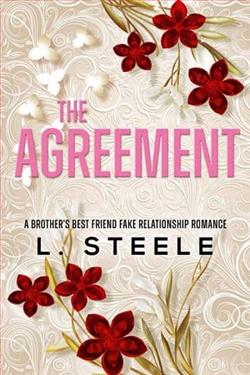Page 4 of Jessica, Not Her Real Name
Jessica turned toward him, intending a more dignified introduction than their one at the strip club, but he was too busy with her suitcase to even glance her way. His movements were efficient, practiced, as if she were just another package to transport.
Sharrow continued, “He’s taking you to a neutral site in Baton Rouge. You’ll be safe there while we make new arrangements.”
Over Inglis’s shoulder, Jessica caught a glimpse of black metal drawers bolted to the bottom of the trunk. Rifle cases. She knew what they were. What they meant.
Her stomach twisted.
She turned back to Sharrow. “You’re not coming with me?”
Sharrow shook her head. “I’m afraid you’re on your own now.”
Jessica had known that before she’d even asked the question. Still, hearing it out loud sent a cold ripple through her chest. Sharrow’s role in her life was over. There’d be another Witness Inspector waiting for her in Baton Rouge, another name she’d have to memorize. Another person guarding the identity of a woman who didn’t exist yet.
Her gaze flicked to the swell of Sharrow’s belly. She was close. Nine months, at least. Their infrequent meetings meant Jessica hadn’t seen her since before the pregnancy. Other than a once yearly check-in, Sharrow had existed in Jessica’s life solely as a contact on her phone, under the name “Aunty Sam”.
There was no round-the-clock monitoring like Jessica had imagined when she’d first entered the federal Witness Security Program. No marshals sitting in darkened cars at the end of her drive. No surveillance of her phone or checking of her mail. The USMS left her to her own devices, provided she followed their extensive list of rules. And she had followed all those rules. To the letter. Changed her habits, erased her past, learned how to live without leaving a footprint. She had built a new life, one small, cautious step at a time.
And yet still, somehow, they had found her.
“Ma’am.” Inglis’s voice was low, firm. He held the car door open.
Sharrow gave a single nod. “Good luck, Jessica.” Not goodbye, but goodluck. It sounded fittingly ominous.
Jessica climbed into the car, and Inglis shut the door behind her. He slid into the driver’s seat, buckled in, and met her gaze briefly in the rearview mirror before pulling away from the curb.
Through the rear window, she watched her house shrink into the distance. It had never been much, just an old clapboard bungalow with an iron roof that turned into a furnace in the summer. The paint on the fascia was peeling. The porch sagged. The lawn was more dirt than grass.
But it had beenhers.The place where she had learned to breathe again. The place where she’d finally felt safe.
Except now she understood—safety had only ever been an illusion.
Jessica let her head rest against the seat, staring out the window as they passed darkened houses and the swaying silhouettes of date palms.
She had the strange, overwhelming sensation that she’d forgotten something. Left something behind.
The thought almost made her laugh.
She was leaving everything behind.
THREE
A neutral sitein Baton Rouge. That was government-speak for a safe house, a secure location where she’d stay while the USMS created all the documents she’d need to start again. Birth certificate, social security number, driver’s license, bank accounts. They’d fabricate education records and medical certificates. They’d invent a whole new life for her and hand it over in a brown manila folder.
She knew all this because she’d spent three months in just such a place, eleven years ago. Right after the trial. Right after…everything. The brief stay had permanently etched itself into her memory.
The Witness Security Safe Site and Orientation Center in Washington, D.C. had been a fortress. A compound within a compound. Armed marshals had patrolled the outer perimeter; the internal building had been a prison-like warren of segregated rooms, separated by doors that opened and closed by themselves. The only entrance had been via a bomb-proof underground car park. Everywhere, there were cameras.
Her room had been self-contained, with a closet-sized bathroom and a tiny kitchenette. There’d been no internet. No phone line. No cell signal. The only form of entertainment had been a stack of mostly kids’ DVDs and a shelf of decaying paperbacks.
Twice a day, they’d let her into the communal yard for fresh air and sunlight. The high concrete perimeter walls had meant it was hard to enjoy much of the latter. Guards carefully timed each of her outdoor excursions so she wouldn’t meet other residents. She’d heard them though, through the walls. Banging. Shouting. And at night, crying.
Her own crying had been done silently, curled up in bed, where she’d spent most of her time.
Other than the marshals, her only human contact had been the doctor who’d administered regular medical examinations. The Bureau of Prisons had dispatched a psychologist to decide if she posed a risk to herself or others. He’d sat opposite her and asked inane questions from a clipboard about her state of mind. The joke was, being holed up in that place was enough to scramble anyone’s mind, regardless of the trauma she’d already gone through.
It had felt like a prison, but it wasn’t. She could have left anytime she wanted. Somehow, knowing that only made it worse. On the days she could get out of bed and muster enthusiasm for life, escape had consumed her thoughts. What had stopped her was the knowledge that the moment she walked out of that place, she’d have been completely on her own. WITSEC was a onetime offer. If you elected to leave the program, you were effectively dead to the USMS.
And, pretty soon after that, you’d be dead to everyone else, too.















